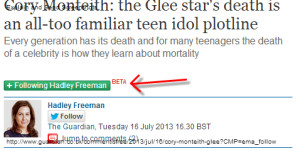 The confluence of the sale of the FT to Japanese company Nikkei and how it will remain independent, the Government’s sustained attacks on the BBC and Gawker’s decision to pull a story are neatly covered in a piece by The Guardian’s Jane Martinson.
The confluence of the sale of the FT to Japanese company Nikkei and how it will remain independent, the Government’s sustained attacks on the BBC and Gawker’s decision to pull a story are neatly covered in a piece by The Guardian’s Jane Martinson.
We seem to be at a time when ever more companies/institutions are struggling with a growing desire from the public/its customers to be transparent/independent, but an equal battle to maintain revenue to satisfy owners/shareholders.
On the same day, Kevin Rawlinson from The Guardian (again) reports on the increasing number of football clubs who are banning journalists from press conferences, in favour of an in-house (and clearly biassed) reporter carrying out interviews.
How to be truly transparent
The fear of being asked difficult questions or being open to scrutiny has haunted many big corporations for years, but it seems to be worse than ever.
In years gone by, I remember being asked to remove reference to a large cosmetics company from a magazine feature, because it was a prominent advertiser.
We weren’t producing groundbreaking investigative journalism, but it struck me as being particularly timid even so.
No charity immunity
Working for a charity doesn’t mean we’re immune to similar issues – after all, even charity staff’s wages have to come from somewhere – but I do feel as if I can ask difficult questions with regard to how the organisation is run: a luxury not everyone has.
Trust is a simple concept, but one that takes time to build and – potentially – seconds to be destroyed.
Hiding behind smokescreens and PR spin doesn’t endear you to anyone.
Although sometimes the tough option, when will people at the top realise that being frank and open is the route that offers the best chance of success.


